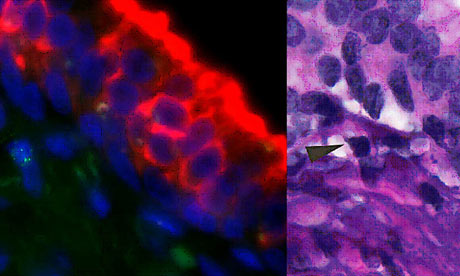
Scientists working on prostate cancer have found evidence that the most aggressive forms of the disease may be caused by a virus.
A team of US researchers found traces of virus inside fast-growing prostate tumours, suggesting it could play a role in the development of the cancer.
The virus, known as XMRV (xenotropic murine leukaemia virus-related virus), is known to cause leukaemia and tumours in animals, but has never been proved to cause cancer in humans.
If a link between the virus and human prostate cancer is confirmed, it would pave the way for better screening programmes, antiviral treatments and protective vaccines that could have a dramatic impact on public health.
Prostate cancer is the most common form of cancer among British men, accounting for a quarter of all cases diagnosed. In the past 30 years, cases have tripled, though much of this increase is due to more stringent screening using the PSA test. Globally, 670,000 men are diagnosed with prostate cancer each year.
Although survival rates have more than doubled since the 1970s, prostate cancer remains the second most deadly cancer in British men, after lung cancer.
Several viruses are already known to cause cancer in humans, including the human papillomavirus (HPV), which is the cause of nearly every case of cervical cancer.
The identification of the HPV virus as a cause of cancer prompted pharmaceutical companies to develop vaccines to protect against the infection, which is spread by sexual contact. Last year, the government began offering jabs to protect schoolgirls from the two most common strains of the virus.
In the latest study, researchers led by Ila Singh, a pathologist at the University of Utah, examined tissue from 101 healthy prostates and 233 malignant prostate tumours. They found the XMRV virus in 27% of the tumours and in 6% of the healthy samples.
Further testing showed that the chance of finding virus in the tumour cells was higher in more aggressive cancers.
The healthy prostate tissue that tested positive for the virus might have become infected only recently, and could be at risk of developing cancer later on, the scientists said.
"We still don't know if this virus causes cancer in people, but that is an important question we're going to investigate," Singh said.
The study, which is published in the US journal, Proceedings of the National Academy of Sciences, raises questions about how the virus is transmitted, whether it is capable of spreading prostate cancer, and if it causes tumours in other parts of the body.
1 comments:
It is found that there is a link between XMRV Virus and Prostate Cancer.XMRV has earlier been found to be related to leukemia and sarcomas in the animal forms. XMRV, a form responsible for cancers noted in animal forms, has not been as yet established as a cause in human being. As per scientists, it needs additional examination to find out.
Post a Comment